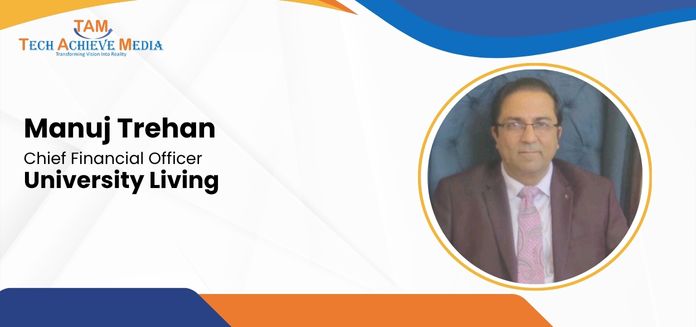Finding the right place to live is one of the biggest challenges students face when moving abroad for higher education. That’s where University Living steps in, making the process of finding, booking, and settling into student accommodation seamless across the world. In an exclusive interview with Tech Achieve Media along the sidelines of TiECon 2025, Manuj Trehan, Chief Financial Officer at University Living, shares how the company is reimagining student mobility through technology, AI, and trusted partnerships, while maintaining steady growth and profitability in a competitive global market.
TAM: Could you give us an overview of University Living and what it aims to solve?
Manuj Trehan: University Living Accommodation India addresses a long-overlooked pain point in the higher education journey, which is student accommodation. Most people focus on admission letters and university selection but overlook where students will actually live during their studies. We specialize in connecting students with Purpose-Built Student Accommodation (PBSA), which is a professionally managed housing that ensures safety, comfort, and convenience.
We handhold property owners, often with thousands of beds, helping them fill their inventory with students from across the world. At the same time, we assist students with everything they need right from booking accommodation and setting up guarantor services to opening bank accounts, making tuition remittances, booking airport pickups, and arranging essential kits. Our platform digitizes this entire 14 to 15-step pre-departure journey, offering virtual 360 degree room views and even the exact bed dimensions. Essentially, what students see online is what they get, and all this is due to AI-driven precision and transparency.
TAM: Which geographies does University Living currently serve?
Manuj Trehan: We operate in the UK, Ireland, Australia, the US, and Canada, and have recently expanded into Europe. Despite certain global headwinds, like visa delays or geopolitical tensions, we’ve doubled our business this year. Interestingly, while some destinations slowed down, others surged. For instance, Germany has become a hotspot for Indian students due to lower tuition costs and a conducive study environment. So, even though overall mobility patterns have shifted, the demand for our services continues to grow steadily at about 15–20% annually.
TAM: How do students typically find you, and how do you ensure credibility in the accommodation listings?
Manuj Trehan: We follow a multi-channel strategy. On one hand, we collaborate directly with 20–30 universities, such as the University of Nottingham, UNSW, the University of Pittsburgh, and King’s College London, where we are featured on their official websites. We’ve also introduced “Living Scholarships”, a unique concept that complements traditional tuition scholarships, allowing students to get up to a month of free accommodation.
On the other hand, we rely on digital outreach namely SEO, keyword marketing (like “student accommodation London” or “student accommodation New York”), and social media communities on Telegram, WhatsApp, and Facebook. Additionally, we partner with education consultants and aggregators who channel student inquiries to us.
As for property credibility, we depend on on-ground verification and student ambassadors, who are students staying in our properties who share real videos and experiences. This peer-driven model ensures authenticity and fosters trust among future students.
TAM: AI and automation are key themes at TiECon 2025. How is AI influencing your business operations at University Living?
Manuj Trehan: AI plays a pivotal role in how we qualify leads, personalize engagement, and optimize conversion. We’ve developed a proprietary chatbot called SABIE (Study Abroad Buddy) that interacts with students, answers queries, and assesses intent. Based on their responses, the system classifies leads by seriousness, enabling our team to focus on high-probability conversions.
We’ve also introduced a 24/7 AI voice bot that interacts with students globally in real-time, capturing information like travel timelines, budgets, and accommodation preferences. These tools have dramatically improved our efficiency and allowed us to operate round-the-clock, across time zones. Ultimately, AI enables us to understand intent, predict outcomes, and improve decision-making, both for our internal teams and for the students we serve.
TAM: Congratulations on winning the Start-up CFO of the Year award. What does this recognition mean to you, and how do you see the evolving role of CFOs in the start-up ecosystem?
Manuj Trehan: I really appreciate how TiE and Binary Semantics have created this recognition for CFOs, who are no longer just financial controllers but true partner-founders. Today, CFOs are deeply involved in every aspect of a company’s journey, tech, strategy, operations, marketing, not just finance.
This award signifies the growing acknowledgment of CFOs as strategic enablers who combine financial acumen with business insight. For instance, at University Living, I’m not only overseeing accounting but also driving initiatives in organic and paid marketing, conversational AI, CRM development, and tech investments.
The finance role has transformed and CFOs are now expected to question every investment, whether it’s a marketing tool or an AI-led operational process, and evaluate ROI rigorously. With technologies like ChatGPT, finance leaders can think ahead, simulate business decisions, and prepare teams for sharper, data-driven discussions.
TAM: How has your experience been at TiECon 2025, and what does this recognition mean for you and your company?
Manuj Trehan: TiECon 2025 has been an exceptional experience, which is authentic, organic, and deeply motivating. This recognition wasn’t solicited or paid for; it was based purely on merit, which makes it even more meaningful. At University Living, we’ve been profitable since inception and never recorded a loss in nine years. We’ve grown from a Rs 3 crore company to a Rs 100 crore one, maintaining strong fundamentals and cash-positive operations throughout.
Awards like these validate not just financial performance but the strategic partnership that CFOs now bring to the table. I believe TiECon and Binary Semantics have done a commendable job in highlighting the evolving, business-oriented role of CFOs in India’s start-up ecosystem.







